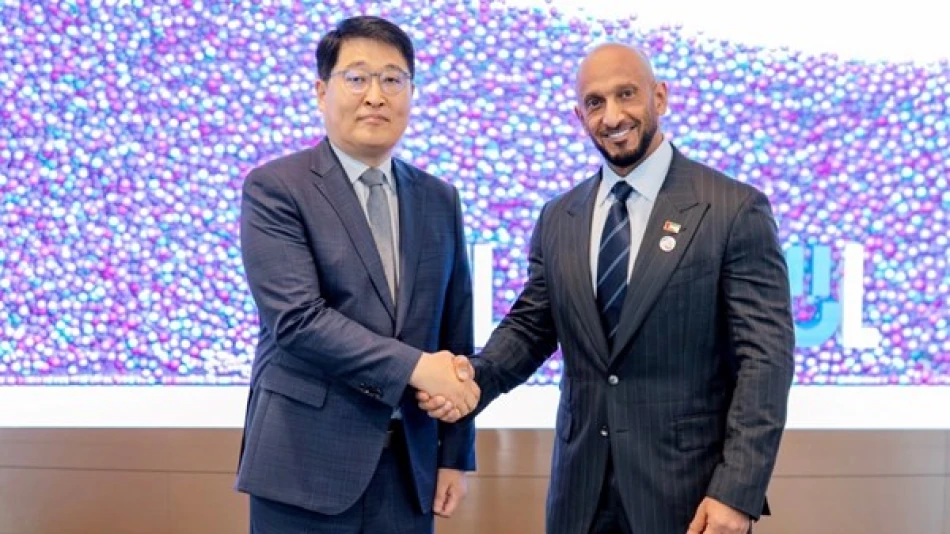
UAE and South Korea Explore Media and Tech Collaboration Opportunities at 'Bridge' Summit
UAE's Bridge Summit Positions Abu Dhabi as Global Media Innovation Hub Through Strategic Asian Partnerships
The UAE is making a calculated push to establish Abu Dhabi as the Middle East's premier destination for media and creative industries investment, with high-level delegations securing partnerships across Asia's most advanced digital economies. The Bridge Summit 2025, scheduled for December 8-10 in Abu Dhabi, represents more than a conference—it's a strategic play to capture market share in the rapidly evolving intersection of AI, entertainment, and digital content creation.
Seoul Meetings Signal Broader Geopolitical Media Strategy
Abdullah bin Mohammed bin Butti Al Hamed, Chairman of the UAE Media Council, led a delegation to Seoul from August 4-6, marking the third stop in an Asian tour that included Shanghai and Osaka. The timing is deliberate: South Korea's entertainment exports reached $13.8 billion in 2022, while the UAE seeks to diversify its economy beyond oil through creative industries.
The delegation's meeting with Kim Tae-kyun, Seoul's First Deputy Mayor for Administrative Affairs, alongside UAE Ambassador Abdullah Saif Al Nuaimi, focused on long-term partnerships rather than ceremonial exchanges. This mirrors similar strategies employed by Singapore and Hong Kong to position themselves as regional media hubs.
Corporate Partnerships Reveal UAE's Digital Ambitions
The Seoul meetings targeted specific technological capabilities the UAE aims to import or replicate. Bruce S. Lee from I-ON Communications presented advances in unstructured data management and digital marketing—technologies crucial for the UAE's smart city initiatives. Meanwhile, discussions with Dentons' senior counsel John Jong-kyum Kim on AI regulatory frameworks suggest the UAE is preparing comprehensive legislation to attract tech investment.
Particularly significant was the engagement with Lotte Caliverse CEO D.K. Kim, whose 3D interactive entertainment and shopping platform aligns with the UAE's metaverse strategy. This partnership could accelerate the Emirates' push into virtual commerce, potentially competing with established players like Singapore's virtual banking initiatives.
Entertainment Industry Partnerships Target Global Influence
The delegation's meetings with SM Entertainment and animation specialist KAIA reflect a broader strategy to leverage South Korea's cultural export success. SM Entertainment's global reach—managing artists like aespa and NCT—offers the UAE a pathway into youth demographics across Asia and beyond.
This entertainment focus isn't merely cultural. The Korean Wave (Hallyu) generated over $12 billion in economic impact in 2021, demonstrating how creative content can drive tourism, consumer goods, and technology adoption. The UAE appears to be studying this model for potential replication.
Investment and Startup Ecosystem Development
Rancho Lee from SimSam Ventures highlighted investment opportunities in creative startups, positioning his firm as a key Bridge partner for cross-border media innovation. This partnership model echoes successful initiatives in the UAE's fintech sector, where international venture capital has accelerated local ecosystem development.
The discussion with Math-presso CEO Jake Lee, whose AI-driven education platform attracts Google investment, suggests the UAE is targeting proven technologies with global scalability rather than experimental ventures.
Regulatory and Academic Foundations
Meetings with legal experts from Lee & Ko and Professor Gul Hwang from Hongik University indicate the UAE is building comprehensive frameworks for media innovation. Ross Harman's dual experience advising government and technology leaders offers insights into balancing innovation with regulation—a challenge the UAE faces as it expands digital governance.
The Korea Press Foundation discussions on media freedom and journalism's future in Asia reveal the UAE's awareness that credible media ecosystems require more than technological infrastructure.
Market Implications and Competitive Positioning
The Bridge Summit strategy positions Abu Dhabi to compete directly with established regional media hubs. Dubai already hosts major international broadcasters, but Abu Dhabi's focus on AI, gaming, and digital content creation targets higher-value segments of the creative economy.
For international investors, the UAE's systematic approach to building creative industries infrastructure—from regulatory frameworks to venture capital partnerships—suggests a serious long-term commitment. This contrasts with other regional initiatives that have struggled with execution.
Strategic Outlook: Beyond December 2025
Al Hamed's emphasis on "proactive policies and strategies" for rapid media landscape changes indicates the UAE recognizes that hosting conferences isn't sufficient. The real test will be whether December's Bridge Summit produces concrete partnerships, investment commitments, and technology transfers.
The UAE's approach—combining government backing, strategic geographic positioning, and targeted industry partnerships—mirrors successful models in Singapore and Hong Kong. However, success depends on execution and the ability to create genuine value for international partners beyond tax advantages and modern infrastructure.
The Bridge Summit 2025 will ultimately be measured not by attendance figures, but by its ability to generate sustainable creative industry growth that positions the UAE as an indispensable link between Asian innovation and global markets.
Most Viewed News

 Layla Al Mansoori
Layla Al Mansoori






